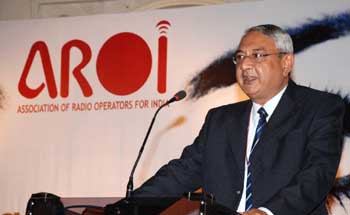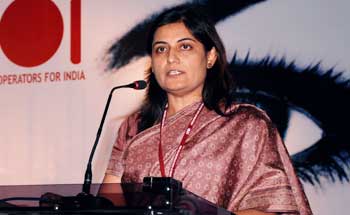I&B secy offers sops to FM industry at AROI meet


NEW DELHI: Information and broadcasting secretary Raghu Menon took radio broadcasters through the proposals of Phase III policy subject to final approval, at the first official conference of the Association of Radio Operators of India (AROI) in New Delhi on Thursday.
For enabling the commercial viability of the radio operations in border areas of North east and Jammu and Kashmir, the ministry is proposing to provide incentives for the new players in Phase III as well as to the existing players.
It has been mooted that radio operators in these border areas be exempted from the restriction of not owning above 15 per cent of the national ownership. The players have been pushing the demand of multiple frequencies with the ministry and the latter has suggested that multiple ownership be allowed in Phase III to allow differentiation and diversity.
On the news and current affairs front, the ministry has agreed on permitting sourced news to be broadcast by commercial FM stations and Menon asserted that the ministry has curtailed the freedom for private content generation, due to absense of local based regulatory authority, but indicated that it would gradually permit it. The ministry will also consider the industry's demand of extending the term of license period from the present 10 years to 15 years, he said.
Menon was speaking at a panel comprising leading radio broadcasters at the Association of Radio Operators for India's �Vision – 2010' on Thursday in the capital. The event commemorated Broadcaster's Day – the day when Mahatma Gandhi gave his first and only radio address to the nation on Nov 12th 1947.
Menon graced the occasion along with senior officials from the ministry, media and the industry. As part of the programme �Vision – 2010', AROI held a day-long conference and exhibition, creating an effective platform for dialogue between the ministry and the industry. �Vision-2010' also showcased new and cost effective technologies for benefit of existing and prospective players. �Vision – 2010' also celebrated achievements of the industry and focused on an in-depth dialogue to discuss the future of the Indian FM industry. Year 2010 is expected to be a landmark for FM radio expansion in India in anticipation of further liberalization under phase III of the FM policy. The conference was attended by over 300 International and National delegates.
Commenting on the same, AROI president Apurva Purohit said, The Indian FM industry has come a long-way in the short life-span of over 8 years. The Industry has faced multiple challenges and crisis but has managed to create a large space for itself amongst mass audiences and listeners... Apurva Purohit, President, AROI further added, FM industry through AROI has been lobbying hard with the government to ensure that some relief is given to the industry, whether it is in extending
the license period from 10 to 15 years, ensuring that the license fee is paid on net and not gross revenue or in getting DAVP empanelment. Similarly, AROI is determined in pursuing its demands for the phase - III policy implementation, in terms of allowing news and current affairs or increased FDI or multiple frequencies. Today's conference has been an appropriate platform to highlight the issues, concerns and opportunities for the upcoming phase. We have been very successful in achieving our aim to build a collective vision for the FM industry for year 2010, to be realized with concerted efforts
of all the stakeholders of Radio industry....
Major highlights discussed during the conference:
- Radio has 98 per cent of reach but the impact of the radio is very low because of stringent government policies.
- FM industry is in urgent need of Policy change. New regulations should come in terms of News, FDI and Multiple ownership
- Between music and radio industry, government has to play a role of a facilitator.
- Upcoming Phase III, allowing news and current affairs on Private FM channels which will not only serve as a differentiator in terms of programming but will also help in getting new category advertisers on board.
The day long conference was divided into the following sessions:
- How have policy changes helped other media grow and can the same happen for Radio - Dainik Bhaskar group director Pawan Aggarwal, India Today group executive director Anil Mehra, Reliance entertainment Ltd. president Rajesh Sawhney, B.A.G Infotainment Ltd. chairman and MD Anurradha Prasad and Media Expert Vanita Kohli Khandekar.
- How Radio can help Social development chaired by UNICEF Chief of communication Angela Walker
- Radio in small towns chaired by MIB Uday Kumar Verma, Adlabs/ Big FM CEO Tarun Katial, Mathrubhumi's Club FM COO George Sebastian, Radio Mantra director Rahul Gupta, Radio Misty CEO Nishant Mittal, Eastern Media ltd's Radio Chokolate director Monica Nayyar, and Red FM Sr Vice President (Programming & Projects) Nisha Narayanan.
- Alternate formats in Radio chaired by ENIL's Radio Mirchi Exec. Director Prashant Panday,Synergy Media's My FM COO Harrish Bhatia, Radio One MD Vineet Singh, Cricketer/ Commentator Atul Wassan, Sports Commentator Jasdev Singh, and NDTV managing editor Pankaj Pachauri
- Beyond Music chaired by United Radio Senior Partner Paul Chantler
- New Technologies and cost effective solutions chaired by Harris GM Jishun Mei, Telos executive director Kirk Harnack, , Radio Systems Daniel Braverman and Eddystone Dale Harvey
- CTI issues: Roadmap for future chaired by ECIL chairman & MD Harkesh Gupta, BECIL director (O&M) I S Mehla and Hyteck communications and Broadcast MD Ashok Narayan.
Send in your comments to: anita.iyer@indiantelevision.co.in














